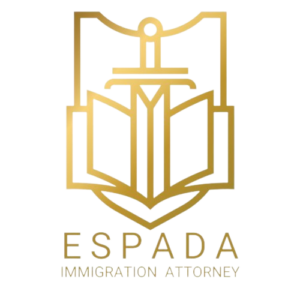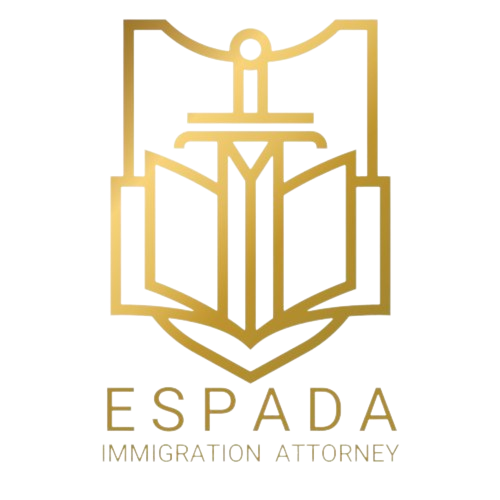VAWA Guide: Comprehensive Overview of the VAWA

The Violence Against Women Act (VAWA) is a significant piece of legislation that allows spouses and/or children of abusive U.S. citizens or lawful permanent residents to apply for a green card through self-petitioning. This means individuals can seek a green card without relying on their abusive spouse’s cooperation.
This guide provides detailed information about VAWA, its requirements, and the application process.
If you have any questions, feel free to email me directly at abbas@espadaimmigration.com. I am a U.S. immigration lawyer and would be happy to assist you.
Important Note: While VAWA stands for the Violence Against Women Act, eligibility is not limited to women. Both men and women who meet the VAWA requirements can apply under this law.
Overview
- What is VAWA?
- Benefits of VAWA
- Who is Eligible to Apply for VAWA?
- VAWA Requirements
- VAWA Process
- Required Documents for VAWA
- VAWA Fees
- VAWA Processing Time
- Conclusion
1. What is VAWA?
The Violence Against Women Act (VAWA) is a federal law designed to protect individuals who have experienced abuse. Despite its name, VAWA is not exclusive to women; both men and women can qualify for its benefits.
VAWA provides an opportunity for certain individuals to self-petition for a green card without needing the involvement of their abusive spouse or parent, provided specific criteria are met. Generally, this applies to individuals who are the abused spouse or child of a U.S. citizen or lawful permanent resident. We’ll explore these qualifications in detail below.
If you meet VAWA’s eligibility requirements, you may apply for permanent residency (a green card) independently, without the abuser’s cooperation. This process allows you to take control of your immigration case without relying on your abusive spouse to sponsor your application.
2. Benefits of VAWA
Ability to Self-Petition
Typically, when applying for a green card through marriage to a U.S. citizen or lawful permanent resident, the sponsoring spouse must file the immigrant petition on your behalf. This involves signing the necessary paperwork and acting as the official petitioner for your application.
However, in situations where the U.S. citizen or lawful permanent resident spouse is abusive, this dependency can lead to manipulation. An abusive spouse might threaten to withdraw the petition or use the immigration process to exert control over the victim. Recognizing this potential for abuse, Congress created VAWA to provide a pathway for victims to escape such situations.
The primary advantage of VAWA is that it enables the abused spouse or child to self-petition for their green card. This means you can independently file your immigration petition without requiring the participation or consent of the abusive spouse or parent.
Immigration Benefits for Children
Another significant benefit of VAWA is its inclusion of children as derivative beneficiaries. If you qualify to apply for a green card through VAWA, your children may also be eligible for green cards, even if they are not biologically related to the abuser.
To qualify, your child must be unmarried and under 21 years old at the time of filing the VAWA petition. This provision ensures that your children can benefit from the protection VAWA offers, helping to secure a safer future for your family.
3. Who is Eligible to Apply for VAWA?
There are five categories of individuals eligible to apply for VAWA:
- Abused Spouse of a U.S. citizen or lawful permanent resident (LPR).
- Spouse of a U.S. Citizen or LPR whose child has been abused by the U.S. citizen or LPR spouse.
- Abused Child of a U.S. citizen or LPR.
- Abused Parent of a U.S. citizen who qualifies as an “immediate relative.”
4. VAWA Requirements
To qualify for VAWA, several specific requirements must be met. Below, we provide a detailed explanation of these requirements.
Marriage to a U.S. Citizen or Lawful Permanent Resident
As the abused spouse of a U.S. citizen or LPR, you must demonstrate that you entered into the marriage in good faith. This means that at the time of the marriage, your intent was to build a life together. A marriage solely for immigration benefits does not meet this standard.
Important Points:
- Intended Marriages: If the marriage was intended but not legally valid due to the U.S. citizen or LPR being married to someone else at the time, it may still qualify under VAWA if entered into in good faith.
- Termination of Marriage: Even if the marriage has ended, you may still qualify for VAWA. To be eligible:
- The marriage must have been bona fide.
- The termination (e.g., divorce) must have occurred within the last two years.
- The termination must be linked to the abusive spouse’s behavior, such as battery or extreme cruelty.
Parent-Child Relationship
If you are the abused child of a U.S. citizen or LPR, you must establish a parent-child relationship with the abuser.
Parent of an Abusive U.S. Citizen
To qualify as the abused parent of a U.S. citizen:
- You must be the parent of the abusive U.S. citizen.
- The abusive U.S. citizen must be at least 21 years old and qualify you as an immediate relative.
Residence Requirement
The residence requirement has two key components:
Current or Past U.S. Residence:
- You must reside in the U.S. when filing the VAWA petition. If you do not reside in the U.S., you must prove:
- The abusive U.S. citizen or LPR is a U.S. government employee or uniformed services member.
- You or your child were subjected to abuse in the U.S.
- You must reside in the U.S. when filing the VAWA petition. If you do not reside in the U.S., you must prove:
Past Shared Residence with the Abuser:
- You must have lived with the abusive U.S. citizen or LPR at some point.
- The shared residence does not need to be current or located in the U.S.
Citizenship Status of the Abuser
To qualify, the abuser must be a U.S. citizen or LPR. However, if the abuser loses their status due to domestic violence-related circumstances, you may still qualify if you file the petition within two years of their status loss.
Evidence of Abuse
To qualify for VAWA, you must show that you were a victim of abuse by the U.S. citizen or LPR spouse, parent, or child.
Forms of Abuse:
Abuse includes battery, extreme cruelty, physical violence, psychological abuse, threats, rape, incest, and forced prostitution.Demonstrating Abuse:
Evidence can include documentation or testimony showing you suffered physical or psychological harm.
Good Moral Character
Applicants must demonstrate good moral character for at least three years prior to filing the VAWA petition.
- Proving Good Moral Character:
Commonly used evidence includes:- Police clearance certificates.
- Tax returns.
- Personal declarations or statements from people familiar with your character.
5. The VAWA Process
Here is a comprehensive, step-by-step guide to the VAWA process:
Consult with an Immigration Lawyer
The first and most crucial step is consulting with an experienced immigration attorney. An attorney will help evaluate whether your case qualifies under VAWA and determine if this is the best option based on your unique circumstances. During this consultation, you might also explore alternative immigration pathways that could be more suitable. Many immigration lawyers provide free initial consultations to guide you in the right direction.
Filing Form I-360
Once you have consulted with an immigration lawyer, the next step involves filing Form I-360 with the U.S. Citizenship and Immigration Services (USCIS). This form, officially titled the Petition for Amerasian, Widow(er), or Special Immigrant, is the main application for seeking protection under VAWA.
Along with the Form I-360, you’ll need to include supporting documents to strengthen your case. These documents are critical and will be discussed in more detail below.
Adjustment of Status
In some cases, you might be eligible to file for adjustment of status (Form I-485) alongside your Form I-360. Form I-485 is the Application to Register Permanent Residence or Adjust Status, allowing you to transition to lawful permanent resident status. Determining eligibility for adjustment of status depends on your specific circumstances. To discuss your case in detail, feel free to contact me at abbas@espadaimmigration.com.
6. Required Documents for VAWA
A strong VAWA application package is built on comprehensive documentation that supports each requirement. Evidence credibility is critical, with primary evidence often carrying more weight than secondary evidence.
- Primary Evidence: Police reports, hospital records, court documents, etc.
- Secondary Evidence: Signed witness statements, affidavits, etc.
Here is a general checklist of documents commonly included in a VAWA petition:
- Cover Letter: Explains the application’s purpose, the basis for applying, and the included documents. This is typically prepared by your attorney.
- Form I-360: The key form for filing a VAWA petition.
- Applicant’s Declaration: A detailed statement explaining how your case meets VAWA eligibility criteria. Collaborating with an experienced lawyer is essential to ensure this declaration is thorough.
- Marriage Certificate: Proof of your marriage to the abusive spouse.
- Birth Certificate: Evidence of your relationship with the abusive U.S. citizen or lawful permanent resident (parent or child).
- Lease Agreement or Property Deed: Establishes cohabitation with the abusive individual and may support claims of a bona fide marriage.
- Proof of Abuser’s Status: A copy of the abusive U.S. citizen or lawful permanent resident’s birth certificate, passport, or green card.
- I-94 Arrival/Departure Record: Demonstrates your physical presence in the U.S. during the abuse and currently.
- Medical Records: Evidence of harm caused by the abuser.
- Police Reports: Documents abusive behavior.
- Photographs of Injuries: Visual evidence of physical harm.
- Psychological Reports: Professional assessments documenting emotional or psychological abuse.
- Signed Statements from Witnesses: Testimonies supporting your character, the validity of your marriage, and the abuse.
- Joint Tax Returns and Bank Statements: Proof of a bona fide marriage.
- Photos with Your Spouse: Evidence of a genuine relationship.
- Utility Bills in Both Names: Further proof of a bona fide marriage.
- Police Clearance Letters: Demonstrates good moral character. Clearance letters are required from every jurisdiction you’ve lived in for at least six months within the past three years before filing.
7. VAWA Fees
Form I-360 Filing Fee
Currently, VAWA applicants are exempt from paying the Form I-360 filing fee. However, it is always wise to verify the latest information on the USCIS website before submitting your application.
Form I-485 Fee
For applicants aged 14–79, the filing fee for Form I-485 (including the biometrics fee) is $1,225. Fees vary by age, so confirm the correct amount before filing.
Immigration Lawyer Fees
If you hire an immigration lawyer, their fees will depend on factors like experience and billing practices. Discuss these details during your consultation.
8. VAWA Processing Time
VAWA applications are handled at the Vermont Service Center. As of now, processing times range from 18 to 23.5 months. For the most current processing times, visit the USCIS website.
9. Conclusion
You should now have a better understanding of the Violence Against Women Act (VAWA). This law enables spouses, children, or parents of abusive U.S. citizens or lawful permanent residents to self-petition for a green card without their abuser’s involvement.
If you have further questions or need assistance with your VAWA application, please feel free to email me at abbas@espadaimmigration.com. I am here to help!
Resources
- USCIS: Green Card for VAWA Self-Petitioner
- Charles Wheeler, Immigration Law and the Family, 4th Edition
- USCIS: Check Case Processing Times
- USCIS: Form I-360, Petition for Amerasian, Widow(er), or Special Immigrant
- USCIS: Form I-485, Application to Register Permanent Residence or Adjust Status
Why Choose Us
Choosing the right immigration lawyer can make all the difference in achieving your U.S. immigration goals. At Espada Immigration Lawyer, we are dedicated to providing exceptional legal guidance and personalized support through every step of the process. Our team combines specialized expertise, transparency, and an unwavering commitment to client success, making us a trusted partner for all your immigration needs.
- Specialized Expertise
- Personalized Approach
- Transparent Guidance
- Client-Centered Commitment

DISCLAIMER: This article is provided for general informational purposes only and does not constitute legal advice. The information herein should not be interpreted as formal legal counsel nor does it establish an attorney-client relationship. This article is neither intended as a solicitation for legal services nor as a substitute for individual legal advice. For specific legal guidance, please consult an attorney in your jurisdiction. Actions based on information in this article are taken at your own risk, and I disclaim any liability for such actions. Please note that information may have changed since publication and may no longer be current. This article does not offer guarantees, warranties, or predictions regarding the outcome of any legal matters. Each case is unique, and results will depend on individual facts and legal issues. Thank you.
ATTORNEY ADVERTISING: Any invitation to contact our law firm on this website and related pages constitutes attorney advertising.
